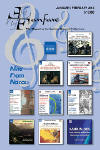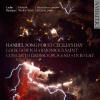Texte paru dans: / Appeared in:

Fanfare Magazine: 36:3 (01-02/2013)
Pour
s'abonner / Subscription information
Les abonnés à Fanfare Magazine ont accès aux archives du
magazine sur internet.
Subscribers to Fanfare Magazine have access to the archives of the magazine
on the net.
Delphian
DCD34110

Ludus Baroque has already made a well-received recording of Handel’s other oratorio with a Dryden text, Alexander’s Feast. Here, the Song for St. Cecilia’s Day is joined by two works from the same year, 1739, and almost the same season. After composing the Song in ten days (!), Handel wrote the 12 concerti grossi for strings. The cantata Look Down, Harmonious Saint was composed in 1736, and was intended, scholars say, to accompany Alexander’s Feast. It was revised in 1742. The Dryden poems were decades old when Handel got to them, and his were not the first musical versions. But they clearly appealed to him, to his dramatic instincts, and to his love of musical effects and gorgeous melody. The three works presented here are logically connected as well as intriguingly varied. I don’t know of another disc that contains them all: at just under 80 minutes, they barely fit. Luckily, they are beautifully recorded, crisply played, and well sung.
Song for St. Cecilia’s Day is the major work here. After the brisk overture, tenor Ed Lyon sings “From harmony, from heav’nly harmony,” commands the elements to “arise ye more than dead,” and waits as the orchestra organizes itself in darting phrases. The world is organized to the power of Music. Music’s role becomes more specific afterwards. What follows is the ravishing melody to the words “What passion cannot Musick raise and quell,” sung here by Mary Bevan. It’s lovely on its own, admittedly with a big vibrato and heavily rolled r’s, but I find Felicity Lott’s singing in the Trevor Pinnock recording (on Archiv) more touching despite its quicker tempo. The Pinnock may be the key competition for the Song. Still, Ludus Baroque has the advantage in recorded sound, and perhaps in Lyon’s singing of such arias as “The trumpet’s loud clangour.” I gather from this short part of the poem that Dryden was no militarist: the compelling argument for charging forward is that “’tis too late for retreat.” (I imagine soldiers asking, Are you sure?) The orchestral playing is compelling, here and in the concerto grosso. The short cantata is given over to the tenor: on recordings, it seems to be an afterthought. I have it at the tail end of a recording of Jephtha. It is therefore easy to recommend this new disc for its stylish playing, generally pleasing singing, and for its repertoire.
Cliquez l'un ou l'autre
bouton pour découvrir bien d'autres critiques de CD
Click either button for many other reviews


